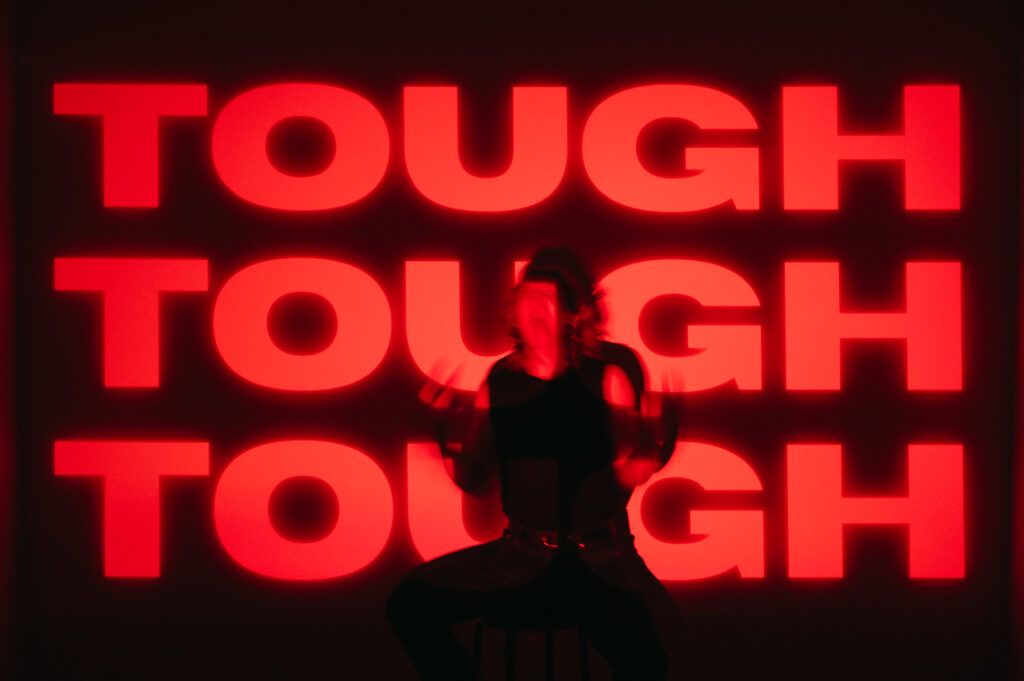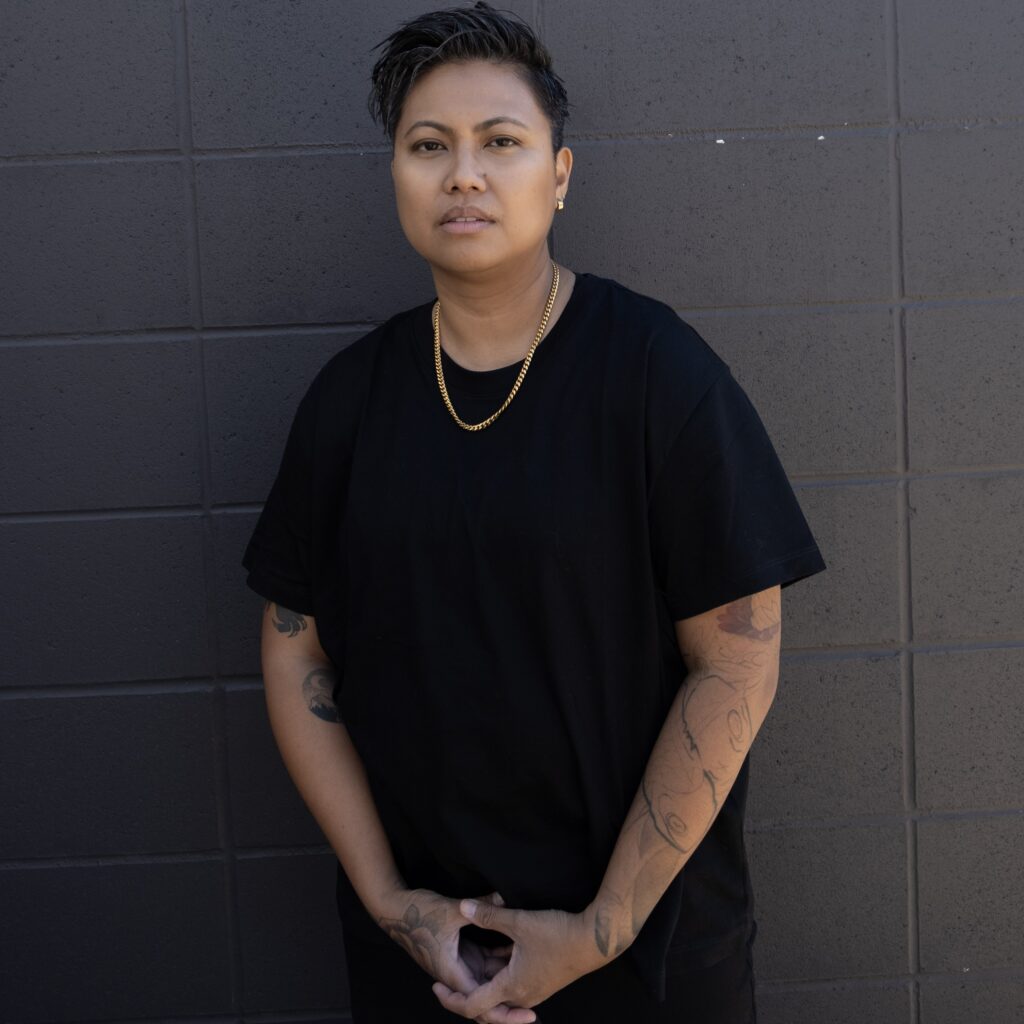Balancing Grief and Celebration in the Soundscape of Tough Guy

There’s a story behind every production you see onstage, from the script’s inspiration to the Artists involved, and more!
Tough Guy, by Hayley Moorhouse, kicks off our 2025/26 Fringe Theatre Season. We chatted with sound designer, Kena León, about the angsty soundscape of Tough Guy and the resilience within the queer community.
If you had to describe Tough Guy in one sentence, what would it be?
Kena: It’s a play about a group of friends navigating grief and trauma together.
Can you tell me a bit about your role in this production?
Kena: I am the sound designer for this production. What I do is really create the soundscape, I get really impacted by how the characters relate to each other and the biggest emotions that come out of the play. For Tough Guy specifically, I was really interested in knowing how the friends related to each other, how they supported each other, how they were in friction with each other, really just grabbing a sense of the vibes.
I remember, I was talking to the director, Brett, about the world and soundscape of Tough Guy, and one of the main things that came out of that conversation was grunge, raw, just really abrasive types of sound palettes, so I leaned into the queer punk sub genre. There’s nothing refined about the sonic scape of this play.
How did you try to creatively strike a balance between grief and celebration while bringing this story to life?
Kena: I come from a music background, so when I try to build a palette of the world, I start with a musical playlist. So, when Brett and I were working together, we had like, the grunge, angry, raw playlist and the ultimate queer joy playlist, like Cobrah or Britney Spears. I’m interested in contrasting the anger and grief versus the uninhibited queer joy. And I find having both of those, in itself, creates that balance.
[In terms of sound design] I tried to capture this by cutting out the middle part of the spectrum of the sonic palettes, [keeping anger and joy sonically distinct] because it clearly showcases where the scene is at and where a character is at in their state of mind. Typically, as a sound designer, you always try to be subtle, but I went ahead and made a decision that there’s going to be nothing subtle about this, because there is nothing subtle about grieving or the healing process

Sound Designer
Healing can look different for everyone, it’s not always linear, and it is certainly complicated by ongoing threats of violence. What role does healing play in the story of Tough Guy?
Kena: Healing shows up in so many forms in this play. Every version of healing is imperfect, it’s such an up-and-down journey.
I think Tough Guy does a great job in terms of shining a light on the need for collective healing, everyone grieves in a different way and the different types of healing definitely lead to some clashes between characters in the play. It’s messy, but it is so necessary for them to go through that mess together, because if you do have someone by your side also grieving in their own way, that, in itself, is providing some kind of healing. The story really shines a light on that you can’t go through something traumatic like this alone.
There is something particularly resilient about the queer community, how does Tough Guy explore the queer community’s capacity for strength and endurance?
Kena: Tough Guy showcases how much pain these characters [as Queer people] go through and the impacts of the hate and violence throughout every scene. And, you know, having the ability to take that weight and still show up for each other despite it, that is a show of queer resilience. For folks in the queer community, sadly, that has become the baseline where we know that we’re just going to be met with hate or violence – we carry that weight, but then, because we do, we also build that muscle and endurance to still show up for others, even with that weight.
A story about the aftermath of a mass shooting in the queer community is already very nuanced. How does adding the issue of representation deepen or complicate the conversation being had through this play?
Kena: Choosing to make a documentary complicates the conversation, because on one end, it’s like, and I hate this reference, but how many times are we going to kick this dead horse [of documenting queer trauma]? But, at the same time, because it is a queer, trans woman that’s making this documentary and telling this story in Tough Guy, it’s like absolutely, let’s do this.
Most of the time, when these stories are told, it’s from a different type of lens not necessarily within the queer community, so it’s actually very important for a character to make this documentary from a queer perspective. And it’s the documentarian’s way of grieving; it’s the one form that they can actually come to terms with what happened and heal. It’s still tough because there’s a possibility of opening healing wounds and retraumatizing folks, so it clashes with other characters forms of healing which is heartbreaking, but [representation] has the opportunity to heal too, it makes a contribution to the community too.
With incidents like shootings, the whole community is affected – folks that weren’t directly affected by an incident can start to be on edge, looking behind their back. For a period of time, I was actively DJing at our local queer bar here in Edmonton, and I do remember there was one point where during a shift I made a point of noticing ‘hey, these are where the exits are, this is where I can hide, this is where people can enter and infiltrate the space’ and that was such a sad reality for me when that happened.
Is there a Tough Guy character you resonate with most in terms of their story or their healing?
Kena: I am either Quinn or Ella. Quinn in a sense because sometimes when the world gets too much, I introspect and dive deep into something else and drown out the world, not necessarily boxing like her, but music. And sometimes I get into parent mode like Ella does, where I feel like I need to take care of everyone.
What do you hope audiences take away from seeing the show?
Kena: I hope they see these characters as human. At the end of the day they’re going through a tough moment and to be allowed the grace to fall apart and be imperfect as they navigate something difficult means a lot.

Join us for this simultaneous excavation of a tragedy and a celebration of the tenacity of queer joy. Tough Guy plays October 28 – November 8, in our Backstage Theatre with tickets for only $26!